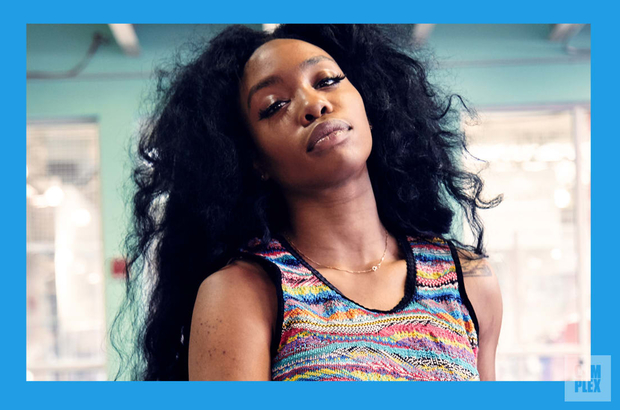JESS EVANS explores the influence of Drew Barrymore on SZA’s electrifying debut album, CTRL.
Listening to SZA’s ‘Drew Barrymore’ can feel a lot like picking off a scab and being surprised when it bleeds. The dreamy, intimate first single from her debut, CTRL, she addresses her anxiety over the power imbalances that can occur in relationships, as she apologises for her flaws to her lover: ‘I’m sorry I’m not your baby mama/I’m sorry you got karma comin’ to you/Collect your soul, get it right’. This is a motif taken from many a rom-com and teen movie, a genre the song’s namesake is practically the patron saint of. Throughout the ‘90s, Drew Barrymore typically played the outcast looking for love, the underdog who we always root for despite the odds. From Josie in ’Never Been Kissed’ to Julia in ‘The Wedding Singer’, Barrymore has perpetually served as a synecdoche and guide for awkward and unpleasant adolescence. SZA (otherwise known as Solána Imani Rowe) told Vulture her teenage experience in New Jersey was akin to Barrymore’s ‘oddball’ characters who seem alienated and out of place. For Rowe, Barrymore was and still is an ‘endless inspiration’, in the way only an icon can be.
Drew Barrymore’s status as a icon reaches far beyond her acting. It is almost impossible to discuss her without mentioning the blurred boundaries between her public and private life, which began before the internet and its subsequent social culture was established. Famous practically from birth, every detail of her life was public, whether she liked it or not: fleeing from her parents at 14; dealing with alcohol, drugs and mental illness, all before the age of 16— Barrymore’s struggle became public property.

It is in this sense that listening to SZA’s CTRL is like Barrymore’s public life: her personal life is aired for the world to see. CTRL is full of ‘grimy shit’, as the musician herself puts it, dirty laundry laid bare, SZA re-spinning her romantic life into soulful, powerful R&B. Across the whole album, she analyses past relationships and not-quite relationships with introspection rather than self-pity. On ‘The Weekend’, the message on polyamory is clear: ‘My man is my man is your man, heard it’s her man, too’. SZA’s tone of sadness isn’t fresh; it is sung with a thoughtful understanding of the situation. The opening track, ‘Supermodel’, sets the tone for the album’s startling openness: ‘Let me tell you a secret/ I been secretly banging your homeboy/ Why you in Vegas/All up on Valentines Day?’. This isn’t a fictional scenario, either – Rowe intended to inform her ex-boyfriend of her act of revenge through the song. This revenge is not bitter, forced or manufactured – it is entirely genuine, with Rowe defiantly telling her ex that she would do it again: ‘Oh no she didn’t/ Oh yes I did/ I’ll do it again’. And yet, she contemplates her own role in this scenario and sings hopefully, ‘I could be your supermodel if you believe/If you see it in me, see it in me, see it in me/ I don’t see myself’. As with many of the tracks on the record, ‘Supermodel’ is a song which hinges on SZA’s insecurities as much as it is does on her confident desire for vengeance.

The track is reminiscent of Barrymore’s bad-girl years, as illustrated by typecast roles in Poison Ivy and Mad Love. Rowe notes this, telling Rolling Stone that Barrymore’s ‘Poison Ivy’ character ‘really just wanted to be loved […] She was lashing out because she was lonely and pissed that her life was like this. I felt that’. Despite the messiness of the situations, these female characters are still essentially lovable. It is with this in mind that Barrymore’s unexpected transition from bad girl to rom-com darling changes the trajectory of her story from one of tragedy to one of survival – she ultimately succeeded, despite the judgement and criticism. This provides a relatable and inspirational scenario for SZA and women of her generation, where the online world is as judgemental as the media tabloids Barrymore faced in the 90’s.
Like a scene from so many of Barrymore’s films, the music video for ‘Drew Barrymore’ showcases a house party, which SZA disappears from to go sit alone on a roof and reflect on her insecurities: ‘I get so lonely, I forget what I’m worth/ We get so lonely, we pretend that this works/ I’m so ashamed of myself think I need therapy-y-y-y’. Rowe’s moment of self-realisation is akin to the emotional breakthrough so many of Barrymore’s characters experience in her films. At this point in the video, Barrymore herself appears on the stairs and knowingly smiles at SZA before walking off. The smile she gives to SZA isn’t a remedy for the situation – she remains isolated and continues to ponder her treatment at the hands of her lover. Barrymore doesn’t bring SZA the happy ending, but her presence exemplifies the ability to turn emotional suffering into musical material. After all, pain (particularly in music and creative art) is the universal which connects us all.
Featured image courtesy of Mambu Bayoh; complex.com





